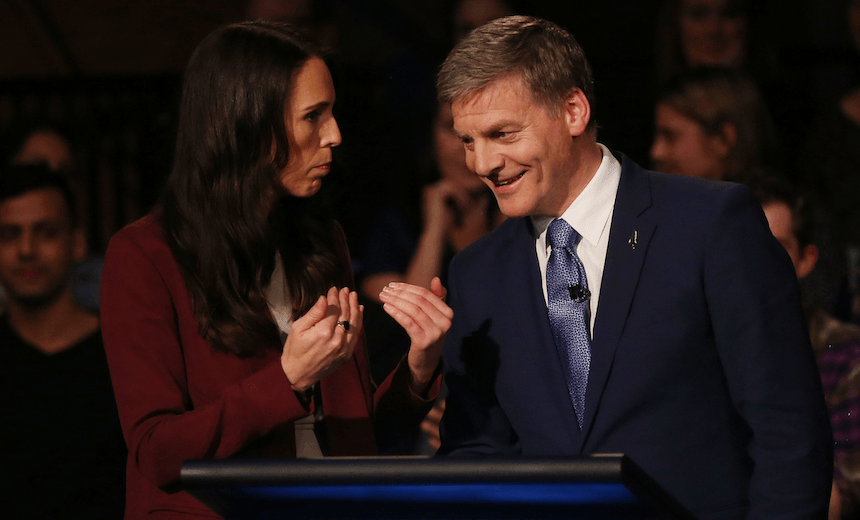Two extra seats felt like a win to many on the left. But Massey University’s Claire Robinson says that historical analysis of prior MMP results suggests this was far from a change election.
Saturday’s final election results were, contrary to how they were received by some, a real blow for Labour. They didn’t pick up the number of special votes they hoped for. They can’t govern alone with the Greens. More importantly, they can’t govern alone with New Zealand First, which Labour would have been holding out hope for. Labour and New Zealand First together have 55 seats. National and ACT have 57 seats.
No wonder Bill English was beaming in the images at his stand up after the announcement of the final result, and Jacinda Ardern was looking grim, flanked by her equally grim looking ‘henchmen’ (her description) Grant Robertson and Kelvin Davis.
National has to only negotiate with NZ First to form the next government. The process is uncomplicated.
Labour has to hold multiple negotiations. Although commentators are treating them as if they are one entity already, Labour and the Greens are not yet a coalition. Labour says it will first negotiate with the Green Party, then with NZ First, and then, presumably, at some stage all three parties will need to come together either physically or virtually to agree on a way forward. This is a complicated process.
Jacinda knows this. She must also know that her argument for still being at the negotiating table is baseless. She’s claiming she has the mandate for change on the grounds that “the majority of New Zealanders voted against the status quo”, and ‘the majority of New Zealanders voted for change”.
In reality there has not been one election since MMP was introduced in 1996 where the ‘winning’ major party got over 50% of the party vote (see table below), and with only 36.9% of the party vote, it’s difficult for Labour to argue that they have more of a ‘mandate’ to form the next government than National on 44.4% in 2017. Moreover, at 44.4%, National’s party vote is greater than Labour’s Party Vote in 1999, 2002 and 2005 — three elections where Labour was more than happy to overlook the fact they didn’t have a majority yet still claim they had the ‘mandate’ to lead the next government.
| 1996 | 1999 | 2002 | 2005 | 2008 | 2011 | 2014 |
| Nat 33.84 | Lab 38.7 | Lab 41.26 | Lab 41.1 | Nat 44.93 | Nat 47.99 | Nat 47.04 |
The final 2017 results show Labour attracted 351,649 more voters than in 2014, which is without question an amazing improvement. But this should not be read as a vote for change so much as a return to home base — the precursor to a genuine vote for change, which is expected to come at the next election.
Labour will have picked up votes from the Greens (who dropped by 94,916 votes), NZ First (who dropped by 21,594 votes), the Internet Mana party (who dropped 30,452). Until we see how votes moved in the NZ Election Study, we’d also have to add some Conservative votes. And Labour got a good proportion of the 175,417 new voters who didn’t vote in 2014.
But to be a vote for change Labour would have had to get more votes than National. In fact National got 20,574 more votes in 2017 than it did in 2014. This is not evidence of a widespread vote to change the major party leading the government. This was a vote for the status quo.
This is devastating for Labour. They don’t want to be in opposition another three years. And to be fair we have to see what transpires this week, before writing them out of being able to form a government. But my research over the past 21 years has shown that where there is a genuine mood for change it shows up in the public opinion polls 12-18 months out from the next election, when more respondents start preferring the major opposition party over the government. If Labour does find itself leading the opposition again after this week it needs to focus on getting to this point, and fast.

